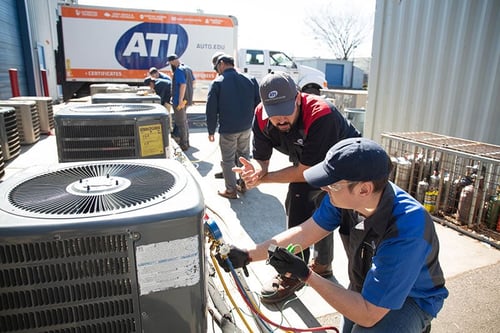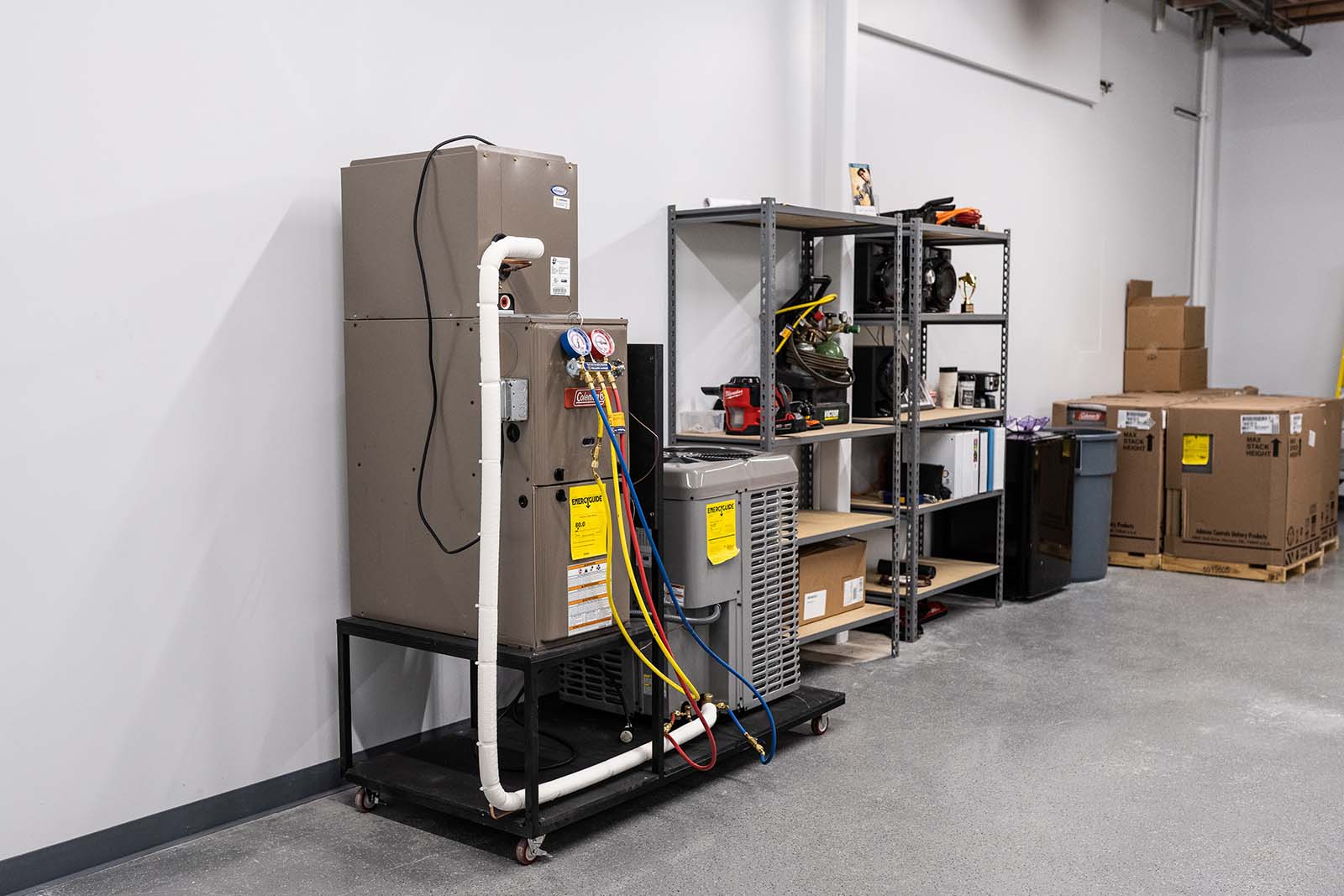Commercial HVAC Contractor Giving Specialist Heating & Cooling Solutions
Commercial HVAC Contractor Giving Specialist Heating & Cooling Solutions
Blog Article
An In-Depth Check Out HVAC Services and Their Influence On Energy Performance and Cost Cost Savings
The duty of HVAC solutions in boosting energy effectiveness and attaining cost savings is extra important than ever before, as businesses and house owners seek lasting options in a progressively eco-conscious world. With technical developments like smart thermostats and high-efficiency parts, the possibility for optimizing system performance is huge. Yet, the true influence of these innovations depends mostly on routine maintenance and positive concern monitoring. As we explore the elaborate connection in between HVAC systems and operational prices, consisting of the change in the direction of environmentally friendly options, the concern develops: just how can these approaches be successfully applied to optimize both economic and eco-friendly benefits?

Importance of HVAC Systems
HVAC systems are an important component of modern buildings, playing a crucial duty in preserving comfortable and healthy indoor environments. These systems, encompassing air flow, home heating, and air conditioning, are crucial for managing temperature level, moisture, and air high quality, therefore guaranteeing the well-being of occupants. Effective heating and cooling systems add substantially to developing an optimum interior climate, which is vital for both business and domestic areas.
In business buildings, heating and cooling systems are essential to giving a safe and productive atmosphere. By regulating indoor environment conditions, these systems assist prevent the development of mold and the spread of airborne impurities, therefore guarding the health of clients and staff members. Furthermore, in household settings, cooling and heating systems enhance living problems by supplying consistent thermal comfort and improving interior air top quality, which is important for general wellness.
Furthermore, the style and upkeep of cooling and heating systems have a direct influence on energy usage and functional expenses. Appropriately designed and maintained systems can dramatically reduce energy usage, causing lowered energy costs and a smaller carbon footprint. The efficiency of these systems hence plays a crucial duty in promoting sustainability and energy preservation within buildings, highlighting their significance in the contemporary architectural landscape.
Advancements in Heating And Cooling Modern Technology
Technology in HVAC technology is revolutionizing the way buildings manage interior climates, ushering in a brand-new period of performance and control. Current improvements have actually concentrated on maximizing power usage while enhancing user convenience. One remarkable development is the integration of wise thermostats, which use fabricated knowledge to find out tenancy patterns and readjust temperature levels appropriately, lowering unnecessary energy usage.
Variable Cooling Agent Circulation (VRF) systems represent another substantial leap ahead. These systems permit precise temperature level control in various zones of a building, improving convenience and reducing power waste. VRF modern technology is specifically helpful for big commercial rooms, providing flexibility and scalability.
In addition, the introduction of Net of Things (IoT) tools has changed cooling and heating systems right into interconnected networks capable of real-time information collection and analysis. This connectivity makes it possible for anticipating maintenance, making sure systems operate at peak performance and reducing unanticipated downtime.
Moreover, developments in products and style, such as using high-efficiency coils and compressors, have boosted general system efficiency - Heating Contractor. The adoption of eco-friendly refrigerants additionally underscores the sector's commitment to sustainability
These technical advancements are pivotal in lowering functional costs and environmental influence, setting brand-new standards for constructing climate management.
HVAC Upkeep and Performance
Making certain optimal efficiency of heating and cooling systems expands beyond technological developments; it additionally depends upon reliable upkeep practices. Regular maintenance is crucial for sustaining effectiveness, minimizing power intake, and expanding the life span of a/c systems. The key objective is to make sure that all parts operate at their peak possibility, therefore minimizing energy wastage and maintaining consistent indoor convenience degrees.
Regular upkeep jobs, such as cleansing or changing air filters, examining cooling agent degrees, and inspecting ductwork for leakages, are important for stopping unneeded stress on the system. Filthy or clogged up filters can obstruct airflow, causing the system to work tougher and eat even more energy. Likewise, inadequate refrigerant degrees can minimize cooling efficiency, causing higher operational expenses.
Furthermore, routine assessments by qualified professionals can determine possible issues before they rise right into costly fixings or system failings. These assessments often include inspecting electric connections, adjusting thermostats, and making certain the overall honesty of the cooling and heating system. By addressing small problems early, home owners and companies can stay clear of unanticipated malfunctions and improve power effectiveness.
Cost-Effective HVAC Solutions
For those wanting to get the most out of their air, air flow, and heating conditioning systems without breaking the bank, exploring economical cooling and heating solutions can make a considerable difference. One more information instant action is More Help to invest in programmable thermostats, which enable individuals to establish certain temperature levels for various times of the day, enhancing power use and lowering unnecessary consumption. By automating temperature changes, property owners can accomplish significant financial savings on power bills.
Normal maintenance is another critical component of cost-efficient cooling and heating monitoring. Making sure that filters are cleansed or replaced consistently, ductwork is sealed, and devices are serviced by specialists can prevent costly repairs and improve system long life. Preventive upkeep not only preserves system performance however likewise aids in staying clear of unforeseen break downs that can cause pricey emergency repairs.
Furthermore, retrofitting existing systems with energy-efficient parts, such as variable speed electric motors or high-efficiency compressors, can be a sensible financial investment. These upgrades improve functional performance, lower power usage, and can typically be carried out at a fraction of the expense of a full system substitute.
Ecological Influence Decrease
Minimizing the environmental impact of heating and cooling systems is critical in today's quest of lasting living. A/c systems are considerable factors to power usage, making up nearly 40% of power usage in commercial structures. This power need commonly counts on fossil gas, resulting in greenhouse gas exhausts and environmental degradation. Transitioning to a lot more effective systems, such as those using renewable resource resources, can significantly mitigate these influences.
Technical advancements in a/c design and procedure, including the combination of smart thermostats and energy-efficient heat pumps, are crucial in decreasing carbon footprints. These technologies permit maximized power usage, decreasing wastage and boosting overall system efficiency. Furthermore, taking on routine upkeep methods ensures cooling and heating systems operate at peak efficiency, further curtailing unnecessary energy consumption.
In addition, the usage of eco-friendly cooling agents is essential, as traditional refrigerants, like CFCs and HCFCs, have been eliminated because of their ozone-depleting properties. Modern alternatives, such as hydrofluoroolefins (HFOs), offer minimized environmental risks, straightening with international ecological protocols. have a peek at these guys By embracing these sustainable techniques, a/c solutions can play a transformative duty in reducing environmental effects, promoting power performance, and promoting an extra sustainable future.
Conclusion

In addition, the layout and upkeep of HVAC systems have a straight impact on energy consumption and functional expenses. Normal maintenance is crucial for maintaining effectiveness, decreasing power usage, and prolonging the life span of Heating and cooling systems. A/c systems are substantial factors to energy consumption, accounting for virtually 40% of power usage in business structures. Additionally, adopting routine maintenance techniques guarantees HVAC systems run at peak performance, more reducing unnecessary energy intake.
The transition to ecologically pleasant HVAC systems additionally advertises and minimizes operational expenses sustainability. (Heating Contractor)
Report this page